- Home
- Jerry Spinelli
Love, Stargirl Page 2
Love, Stargirl Read online
Page 2
I backed away as quietly as I could.
January 27
I babysat Dootsie today. Her mother and father said they needed to “escape.”
Dootsie lives on Ringgold Street, a short bike ride away—but a long walk for a little girl on a cold day at six in the morning. I still can’t believe she did that. When I arrived she was invisible. You know she’s disappeared when you see her standing at stiff attention with her face scrunched and her eyes squeezed shut. She was in a corner in the dining room. I said to her mother, “Well, it looks like Dootsie’s gone. Nobody here for me to babysit. I guess Cinnamon and I will have to go home. Bye.”
As I turned to go, Dootsie screamed. “No! I’m here! I’m here! I’m just imizible!” She came running. “Cimmamum!”
So I stayed and the Pringles went out and Dootsie played with Cinnamon and then we painted her room. She paints her room almost every day. She’s allowed to paint anything she wants in her room except the windows. Walls. Doors. Furniture. Think: balloon filled with 50 paint colors bursts and splatters room. Think: squashed aliens. Think: little-kid paradise. Don’t think: little-princess room with canopy bed and ruffles and frills and pink. So there I was, brush in hand, letting loose the bedroom-painting maniac that hides in all of us.
Then we talked about you.
Dootsie: “Do you have a boyfriend?”
Me: “I’m not sure. I used to.”
Dootsie: “What’s his name?”
Me: “Leo.”
Dootsie: “Is Leo a human bean?”
Me: “We’re all human beans.”
Dootsie: “Do you love him?”
Me: “I think so.”
Dootsie: “Does he love you?”
Me: “He did. And then he didn’t. I think he will again.”
Dootsie: “When?”
Me: “Someday.”
Dootsie: “Where is he?”
Me: “In the state of Arizona. Far away.”
Dootsie: “Why?”
Me: “Why what?”
Dootsie: “Why is he far away?”
Me: “He goes to school there. I moved here to Pennsylvania.” (Oops…now you know. We moved to your home state. Well, I won’t narrow it down any more than that.)
Dootsie: “Did he kiss you?”
Me: “Yes.”
Dootsie: “Did he kiss Cimmamum?”
Me: “Yes.”
Dootsie: “I don’t wanna talk about him anymore.”
So we talked about other stuff and painted some more, and then she said, “Let’s go visit Betty Lou.”
“Who’s Betty Lou?” I said.
“Our neighbor. She’s afraid to go out. She’s diborced.”
This sounded interesting. I left a note on the dining room table in case the Pringles came home early, and we went next door and rang the bell. The door seemed to open by itself. No one was there, but a voice said, “Come in.”
“She’s behind the door,” Dootsie said, and waltzed in. She waved. “Come on.”
I went in, the door closed, and standing before me was a person in a purple bathrobe and bright red slipper socks. Dootsie pointed at me. “This is my friend Stargirl. She kissed a boy named Leo.”
The person shook my hand, smiled. “Betty Lou Fern.” Dootsie thrust out her hand, which Betty Lou shook also. “Did she tell you I’m afraid to go out?”
“Right after she told me you’re the neighbor.”
She laughed. A big, bold laugh. “She tells everybody. The whole town knows I’m agoraphobic. Isn’t it silly?” She waved us on. “Come into the kitchen. I’ll make us hot—EEYOWWW!”
Suddenly Betty Lou was standing on a dining room chair, screaming, “A rat!”
Cinnamon was poking his head out of Dootsie’s coat pocket.
“It’s just Cimmamum,” said Dootsie. She pulled Cinnamon out and offered him to Betty Lou. Betty Lou screamed louder.
I took Cinnamon. “Cinnamon is my pet rat.” I lowered him deep into my pocket. “He’s really tame and friendly.”
“But he’s a rrrat.” She snarled the word. “There’s a rrrat in my house.” She stepped up onto the table. The teased top of her black and gray hair was flattened against the ceiling. She was trembling.
“I’m really sorry,” I said. “We’d better go.”
“No!” shrieked Dootsie. She jabbed her finger. She scowled. “Betty Lou, you come down here. Right now.”
“I can’t.”
And then a new look of horror came over Betty Lou. She covered her eyes with her hands. “Stop!”
I looked at Dootsie. She had rolled her eyeballs up till they disappeared. Mucho creepy. “Are you coming down?” she said.
Betty Lou squeaked, “Are you going to keep the beast out of sight?”
“Yes.”
“Are you going to let its tail touch me?”
“No.”
“Put your eyes back.”
“Okay.” Dootsie’s eyeballs rolled back down into place. “I did.”
Betty Lou came down and made hot chocolate. She took donuts out of the freezer and warmed them in the microwave. “I always have something good to eat for Dootsie. That’s how I lure her over here. Since I’m afraid to go out, I have to find ways to make people visit me.”
Dootsie piped, “I’m her best visitor!”
Betty Lou laughed. “She’s right. She visits me almost every day.”
“And every day I get a donut!”
Betty Lou nodded. “Once a week I have a dozen delivered from Margie’s Donuts.”
She took a bite of her crème-filled. “Mmm. Margie calls them the best in the world. She’s right.”
I asked her, “Do many people have agoraphobia?”
“More than you might think.” She glanced nervously at the living room. I had taken off my winter coat and put it on the front porch. Cinnamon was warm in the pocket. “Don’t rodents flatten themselves?” she said. “Do you suppose he could squeeze under the front door?”
“He can’t make himself that flat,” I told her. “You’re safe.”
“The word ‘agoraphobia’ comes from the Greek,” she said.
“It means fear of the supermarket!” piped Dootsie.
Betty Lou laughed. She curled her fingers in Dootsie’s hair. “Close enough. When she hears me say it a few more times she’ll get it right. It’s fear of the marketplace. And Dr. Dootsie’s personal diagnosis for me is—” She nodded at Dootsie.
“She’s a mess!”
Betty Lou howled. For someone so fearful, she seemed surprisingly jolly. “It just popped out of her mouth one day: ‘You’re a mess!’ I haven’t stopped laughing yet.”
“So it’s not just the marketplace you’re afraid of,” I said.
“It’s everywhere.” She pointed. “Everywhere on the other side of that door. Isn’t it silly? I keep telling myself, There’s nothing to be afraid of. Look at all those other people walking around out there—all those human beans, as Dootsie would say. Nothing bad is happening to them. But I can’t seem to convince myself.”
I tried to imagine being afraid to go outside. I couldn’t.
“How long?” I said.
“Nine years now,” she said. “It started on a beautiful sunny day in May. May nineteenth. The birds were singing, the flowers were blooming, the weather was warm. It was one of those perfect days you get a couple times a year. I had my garden gloves on because I was going to the backyard to plant my tomatoes. I had three tomato plants in those little green plastic boxes. Better Boys. And I went to open the back door and the knob was stuck. I couldn’t seem to turn it. I tried and tried, even with two hands. Finally it turned, but by then—I don’t know—it’s like something had happened, like that stuck doorknob was telling me maybe I didn’t want to go out after all. And then the phone rang, so I took off my gloves and went to answer it. It was my old friend Hildegard. We always talk forever. When I finally got off the phone, there were two messages waiting, so I dealt with them, and then it was ti
me to make lunch and then I had to watch my soaps, and it wasn’t until the next morning that I noticed the three tomato plants still on the kitchen counter. And somewhere deep inside myself I knew I didn’t really want to…”
She stopped. She stared at the counter, but she was seeing something farther away. I don’t think Dootsie and I were breathing.
“…want to…plant them anymore,” she went on. “So I just stood at that back door there”—she nodded to it—“and just stood there and stood there and stared at the doorknob, and finally I quick reached for it and turned it and suddenly the door was open, and I just…stood there. I couldn’t move. The fresh air washing over me felt threatening. The world outside that…that rectangular door frame, it was all too much, too big. Dangerous. I’d like to tell you I fought valiantly with myself, that I tried really hard to step over the threshold into the backyard. But I didn’t fight. I knew I wasn’t going to do it. I closed the door and I haven’t opened it since. I only open the front door to let in visitors.”
“She doesn’t even put her hand out to the letter box!” said Dootsie.
“Not even that,” said Betty Lou. “Dootsie brings my mail in. She stands on a porch chair and reaches in and gets it. I have my groceries delivered.”
Dootsie blurted: “And donuts!”
“And donuts,” said Betty Lou. “A girl named Alvina brings them from Margie’s every Monday.”
Dootsie frowned. “I hate Alvina.”
Betty Lou frowned. “Be nice.”
“Alvina is a grump.”
Betty Lou laughed. “True. But Alvina brings your donuts, doesn’t she? She leaves them on the porch and Dootsie brings them in with the mail.”
“Wow,” I said. “Quite a system.”
Betty Lou nodded. She smiled sadly. “Wow is right. It’s called coping. And I haven’t even told Dootsie this yet—the other day for about ten seconds I was almost afraid to come out of my bedroom.” She looked around the room. “Good grief. Afraid of my own house. I’m getting worse.”
“Hey!” piped Dootsie. “I’m getting worse too. Mommy said.”
“And did Dootsie tell you I’m divorced?” said Betty Lou.
“I’m afraid so.”
“She calls her old hubband Potato Nose!”
“Mr. Potato Nose,” corrected Betty Lou.
That gave us all a laugh. We did a lot of laughing until Mr. Pringle came to the door to fetch Dootsie. As I rode my bike home, I kept thinking of two people—the lady in the house who won’t go out and the man at the cemetery who won’t go in.
February 6
Snow.
Gobs of it. Up to my knees. Up to Dootsie’s ears. We made a snowman. I took Cinnamon out of my pocket so he could see it. I put him on my shoulder. I sneezed. The sneeze knocked him off. We looked down. Nothing but a hole in the snow. Cinnamon! Four hands digging frantically. We got him. He was freezing. Shivering. His tail was blue. We breathed our warm breaths on him and rubbed him and kissed him. When he kissed us back, we knew he was going to be OK, even though his tiny tongue was cold.
February 14
February 18
Do you know what day this is, Leo? It’s First Kiss Day. Four days after Valentine’s. One year ago tonight. Outside my house. My happy wagon was full. I was so stuffed with happiness there wasn’t room for any more.
Today I took one out. It’s down to four.
February 22
Field trip assignment: Margie’s.
Margie’s little donut shop. It’s on Bridge Street between Pizza Dee-Lite and Four Winds Travel. The sign says BEST DONUTS IN THE WORLD!
I went for lunch. I had a powdered-chocolate and an old-fashioned. There are four counter seats and one small table. I sat at the table and watched the customers come and go. Margie said she didn’t mind, she was glad for the company. Margie is plump, like her crème-filleds, an explosion of bleached blond hair. She’s a talker. She talked to everybody who came in. She never stopped talking to me. By 2:00 p.m. I knew that she lets her underarm hair grow in the winter, that beans don’t give her gas but chickpeas do, and that the most glorious thing in her life is getting her feet rubbed.
I was surprised how many people eat donuts for lunch. The four counter seats were always occupied. Margie is taking donuts where no donuts have gone before. You want chicken soup for lunch? Fine, open a can. But you want donut soup? It’s Margie’s or nowhere. She’s also got donut pudding and a donutwich, and she says a donut pie is “in development.”
I had already started to write my poem, called “Donut Soup,” when I heard a loud thump and the door blew open and suddenly there was a girl in the middle of the shop, squatting, panting, facing the door, screaming red-faced at three boys on the sidewalk:
“Ya ya ya ya ya!”
The boys yelled back:
“Yer ugly!”
“Yer dead meat!”
“Everybody hates you!”
Margie came flapping her arms. “Scram!” The boys scrammed.
Turns out the girl works there. Not officially. She’s too young. Eleven. Gets paid in donuts. She comes in after school. Sweeps, dusts, washes, bags trash, bothers Sam the donut maker in back.
She came sweeping toward me. She stopped, stared. “Ain’t you eating?”
“Not at the moment,” I said.
“So you gotta go,” she said. “You can’t just sit here. Bums do that. You gotta buy something. This is a business. It ain’t the Salvation Army.”
“I’m not a bum,” I said.
“So buy something.”
So I bought another powdered-chocolate, just to keep the peace.
She went off sweeping but came back in a minute. “What are you writing?”
“A poem,” I told her.
“What about?”
“Donuts,” I said. “Or maybe you.”
She sneered. “Yeah, right.” Her short weedy hair looked like something Cinnamon would be happy nesting in. She wore a blue and red striped T-shirt and a yellow plastic Pooh Bear on a black shoestring necklace. “What’s your name?”
“Stargirl.”
She gaped. “Stargirl? What kind of name is that?”
“I gave it to myself,” I said.
She sneered. “You can’t name yourself.”
“I did.” She stared at me, blinking. The broom was still. “So what’s your name?” I said.
“I hate my name.”
“I won’t.”
“Alvina.”
“That’s cool,” I said. “It’s different. Old-fashioned.”
“Yeah, like a donut.”
“Alvina…,” I said, remembering. “Are you the girl who delivers Betty Lou Fern’s donuts each week?”
She glared. “What if I am? You got a problem?”
I put up my hands. “Hey, just asking.”
She pointed at my notebook. “That poem really about me?”
“Could be,” I said. “Not sure yet. I’m waiting to find out if you’re interesting or not.” I gave her a tilted squint. “Are you?”
“I’m boring.”
I laughed. “Nobody’s boring.”
“I stink.”
I laughed again. I took her arm and sniffed it. “You smell okay to me.”
“I’m ugly.”
“No you’re not. Don’t listen to those boys.”
“I hate boys.” She picked up the broom and held it like a machine gun. She stepped back. She sneered and raked the shop with her jittering broomstick-and-bullet chatter. “I’d kill them all. I’d line them up and mow ’em down. Every one. Thousands. Millions!”
“That’s a lot of ammo,” I said.
“I hate ’em,” she said, and went back to sweeping the floor.
I doodled poem lines for a while. I looked up to find I was the only one in the shop. Everyone else was in back. Then…
FIELD TRIP:
STOMPING AT MARGIE’S
The door opens slowly.
The boys come in, quiet,
They look at me, eyes asking,
Will you spoil it?
My eyes reply, I’m the poet.
I’m writing this. You’re
living it.
One puts finger to lips: Shhh.
I change my mind: “No!”
Too late—
fast as boys, they’re behind
the counter, scooping donuts, armloads,
squealing boy squeals,
Margie rushing in—“Hey! Hey!”—
the boys rushing out, donuts spilling—
one boy at the door stops, turns, drops
a raspberry-filled to the floor, raises his knee
to his chest, yells “Yee-hah!” stomps,
the donut squirting raspberry all the way
to the counter.
“Don’t try to save them,” says Margie.
“Throw them away.”
Alvina sweeps the fallen donuts with great care
into a heap.
She shapes, she molds the heap
with her broom.
She looks at the boys mocking
in the street, laughing,
gorging, spewing donuts.
The broom clatters to the floor.
She jumps,
both feet come down on the
pile of donuts,
up down
up down
she stomps the donuts like she
used to stomp puddles when she was
little,
stomp
stomp
stomp
while the boys, frozen now,
gape, open mouths full of
unchewed donut.
February 28
It snowed yesterday. Today the world is white. I put on my boots and walked to Enchanted Hill. It was as pure and perfect as a new sheet of paper. I took one step onto the field and stopped.
What was I doing?
The pure whiteness, dazzling in the sun, was one of the most beautiful things I had ever seen. Who was I to spoil it? Snow falls. Earth says: Here—a gift for you. And what do we do? We shovel it. Blow it. Scrape it. Plow it. Get it out of our way. We push it to our fringes. Is there anything uglier or sadder than a ten-day-old snow dump? It’s not even snow anymore. It’s slush.

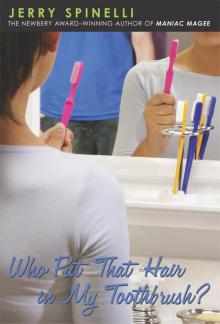 Who Put That Hair in My Toothbrush?
Who Put That Hair in My Toothbrush?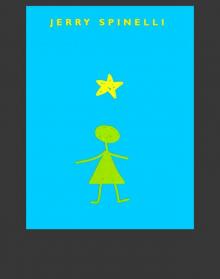 Stargirl
Stargirl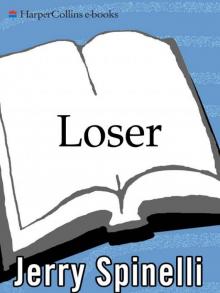 Loser
Loser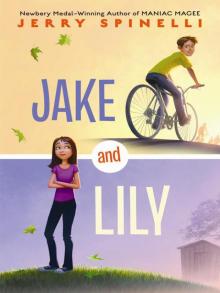 Jake and Lily
Jake and Lily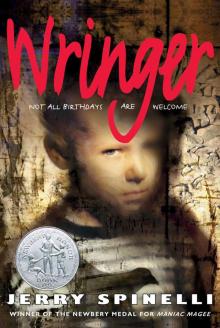 Wringer
Wringer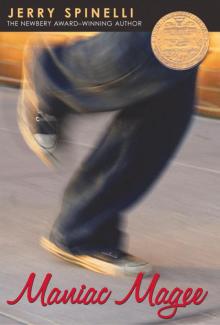 Maniac Magee
Maniac Magee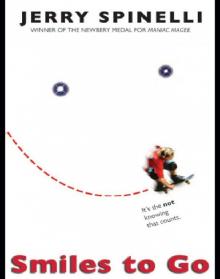 Smiles to Go
Smiles to Go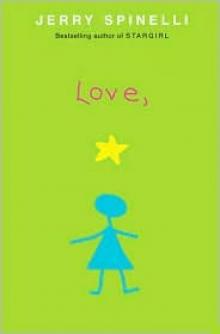 Love, Stargirl
Love, Stargirl Hokey Pokey
Hokey Pokey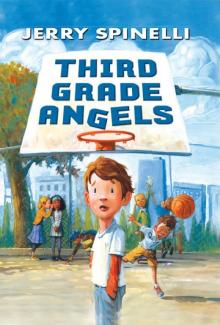 Third Grade Angels
Third Grade Angels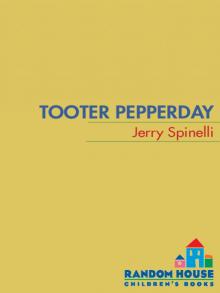 Tooter Pepperday: A Tooter Tale
Tooter Pepperday: A Tooter Tale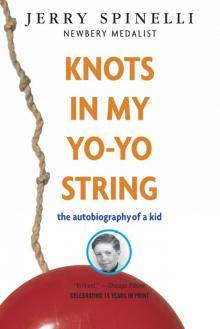 Knots in My Yo-Yo String Knots in My Yo-Yo String
Knots in My Yo-Yo String Knots in My Yo-Yo String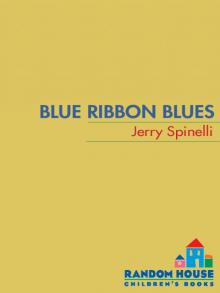 Blue Ribbon Blues: A Tooter Tale
Blue Ribbon Blues: A Tooter Tale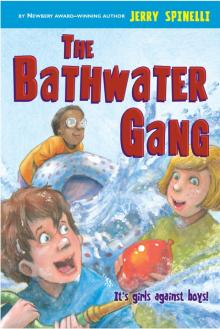 The Bathwater Gang
The Bathwater Gang Crash
Crash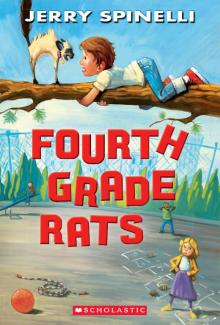 Fourth Grade Rats
Fourth Grade Rats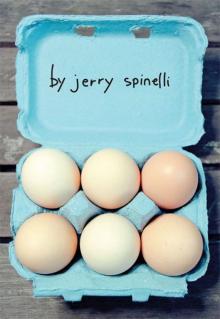 Eggs
Eggs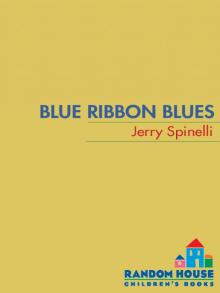 Blue Ribbon Blues
Blue Ribbon Blues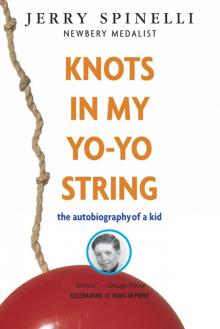 Knots in My Yo-Yo String
Knots in My Yo-Yo String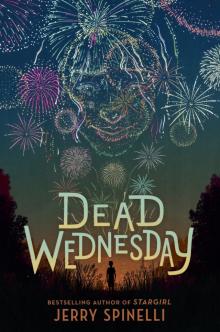 Dead Wednesday
Dead Wednesday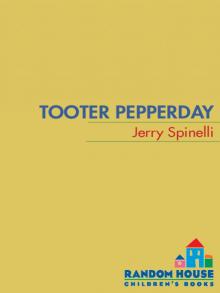 Tooter Pepperday
Tooter Pepperday